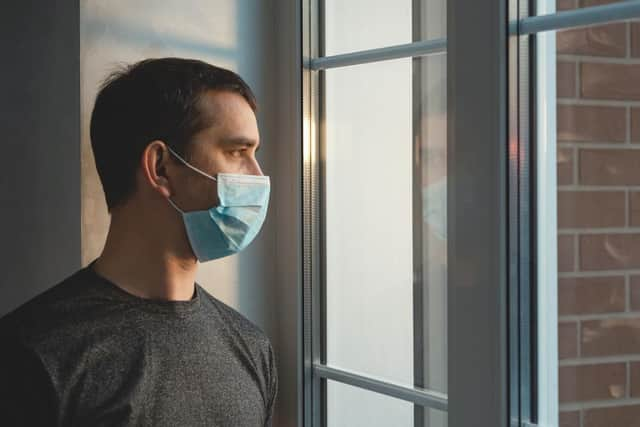When to self isolate: self isolation rules explained if you have symptoms, or have been in contact with Covid
and live on Freeview channel 276
Covid cases are rising across the UK as the Delta variant continues to spread.
But what are the rules for self-isolating if you have tested positive for Covid-19 or have been in close contact with someone who has, and how long do you have to isolate for?
Here’s what you need to know.


Advertisement
Hide AdAdvertisement
Hide AdWe want to hear from you: let us know what you think about this story and be part of the debate in our comments section below
When do I need to self-isolate?
You need to self-isolate immediately if:
- you have any symptoms of Covid-19, including a high temperature, a new, continuous cough or a loss or change to your sense of smell or taste
- you've tested positive for Covid
- someone you live with has symptoms or tested positive
- someone in your childcare or support bubble has Covid symptoms and you’ve been in close contact with them since their symptoms started or during the 48 hours before they started
- someone in your childcare or support bubble tested positive and you’ve been in close contact with them since they had the test or in the 48 hours before their test
Advertisement
Hide AdAdvertisement
Hide Ad- you've been told by NHS Test and Trace or the NHS Covid-19 app that you've been in contact with someone who has tested positive
- you have arrived in the UK from an amber list country
What do I do if I've been exposed to someone with Covid?
If you test positive for Covid then your self-isolation period includes the day your symptoms started - or the day you had the test, if you do not have symptoms - and the next 10 full days.
If you get symptoms while you're self-isolating, the 10 days restarts from the day after your symptoms started.
If someone you live with tests positive for Covid then your self-isolation period includes the day their symptoms started - or the day they had the test, if they do not have symptoms - and the next 10 full days.
Advertisement
Hide AdAdvertisement
Hide AdIf someone in your childcare or support bubble has tested positive and you’ve either been in close contact with them since their symptoms started or during the 48 hours before their symptoms started, or have been in close contact with them since they had the test or during the 48 hours before their test (if they have not had symptoms), then your self-isolation period includes the day you were last in contact with the person and the next 10 full days.
You will also need to self-isolate immediately if you get a text, email or call from NHS Test and Trace telling you to self-isolate or if you get an alert from the NHS Covid-19 app telling you to self-isolate.
Your self-isolation period includes the day you were last in contact with the person who tested positive for Covid and the next 10 full days.
If you arrive back in the UK from an amber list country then you will need to self-isolate for a period of 10 days.
Advertisement
Hide AdAdvertisement
Hide AdYou can end your quarantine early through the Test to Release scheme by paying for a private Covid-19 test on day five. If the result is negative (and the result of your day two test was negative) you can end your quarantine.
You must still book and take your mandatory day two and day eight travel tests, even if your Test to Release result is negative.
Can I walk my dog while self isolating?
According to the Department for Environment, Food & Rural Affairs and Animal and Plant Health Agency, if your animal cannot be exercised at home, you should ask someone outside of your household or support bubble to exercise your animal for you, or access exercising services provided by a professional.
If you are exercising an animal on behalf of someone who is self-isolating, you should:
- wash your hands before and after contact with any animals
Advertisement
Hide AdAdvertisement
Hide Ad- keep 2 metres away from anyone who is not in your household or support bubble, where possible, or 1 metre with extra precautions in place (such as wearing face coverings) if you cannot stay 2 metres apart - this includes when you hand the animal over to someone else
Comment Guidelines
National World encourages reader discussion on our stories. User feedback, insights and back-and-forth exchanges add a rich layer of context to reporting. Please review our Community Guidelines before commenting.
